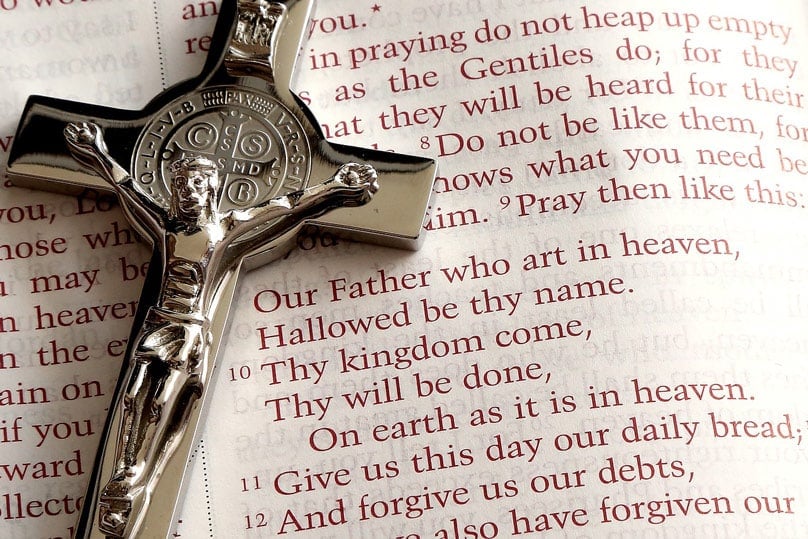
“In the past few weeks several friends have told me that the Pope has changed the wording of the Our Father. Is this true and, if so, what is the new wording?”
It is not true that the Pope has changed the Our Father, although he has said something about it. The facts as they unfolded are the following.
First, the French bishops adopted a new translation of the Lord’s Prayer in the Roman Missal which went into effect on the first Sunday of Advent 2018. The translation changed “lead us not into temptation” to the French equivalent of “do not let us fall into temptation.”
Sometime later Italian television aired an hour-long interview with Pope Francis in which he was asked about the new translation.
He commented: “It’s me who falls. It’s not Him who pushes me into temptation, as if I fell. A father doesn’t do that. A father helps you to get up right away. The one who leads into temptation is Satan.”
What the Pope says is true. God does not lead us into temptation; the devil does. But “lead us not into temptation” are the words Our Lord himself gave the apostles when he taught them the Our Father (cf. Mt 6:13) and they are the words we have used in English ever since. Both the Greek and the Latin can be translated as “lead us not into temptation.”
St Jerome’s Latin Vulgate Bible translation, taken from the Greek, is “ne nos inducas in tentationem”, which is literally “lead us not into temptation.”
As regards to the Greek, the Catechism of the Catholic Church teaches: “This petition goes to the root of the preceding one, for our sins result from our consenting to temptation; we therefore ask our Father not to ‘lead’ us into temptation.

It is difficult to translate the Greek verb used by a single English word: the Greek means both ‘do not allow us to enter into temptation’ and ‘do not let us yield to temptation’” (CCC 2846).
Thus the words “lead us not into temptation” are to be understood in the sense of asking God not to let us fall into temptation. In the words of the Catechism: “We ask him [God] not to allow us to take the way that leads to sin. We are engaged in the battle ‘between flesh and spirit’; this petition implores the Spirit of discernment and strength” (CCC 2846).
More recently, at the beginning of June 2019, Pope Francis approved the translation of the third edition of the Roman Missal prepared by the Italian bishops’ conference. This translation, like the French, has changed the wording of the Our Father, in this case to “do not abandon us to temptation”.
So to date Pope Francis has approved new translations of the Lord’s Prayer in the missals of two countries. He has not changed the translation for the whole world.
It is for the bishops of each language group to propose the change, which must be approved by the Holy See.
As regards to the English, the translation of the third edition of the Roman Missal was issued back in 2011 and it is the one we use at present. It has the traditional rendering of the Our Father with its somewhat old-fashioned wording, with expressions like “hallowed be thy name” and “thy kingdom come.”
The thinking of the English-language bishops was obviously that the words of the Our Father are so traditional and familiar that they should not be changed.
But is this translation too about to change? A spokesperson for the bishops of England and Wales has said that the International Commission on English in the Liturgy (ICEL) “is not currently considering the Lord’s Prayer,” and that “there are no plans at present for [the Our Father] to change in English.”
A spokesperson for the Scottish bishops said there were no plans to adopt the changes, while the Irish bishop in charge of liturgy said that, “In consultation with bishops from other English-speaking countries, the Irish Catholic Bishops’ Conference will give close attention to the reported change to the Lord’s Prayer. The bishops will look at the implications for both the Irish and English translations of this much loved and universal prayer.”
In the meantime we will continue to say the Our Father both in Mass and in our personal prayers in its traditional form.
Related stories:
